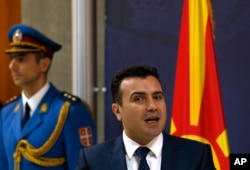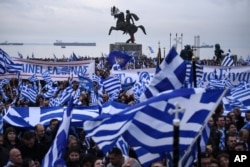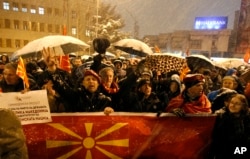Macedonia is looking at four options to settle a decades-long dispute with Greece over its name, Prime Minister Zoran Zaev told Reuters in an interview Tuesday.
The small ex-Yugoslav republic and its southern neighbor Greece have agreed to step up negotiations this year to resolve the dispute, which has frustrated Skopje's ambition to join NATO and the European Union.
Athens, which like all members of both organizations has a veto over admissions, objects to the use of the name Macedonia, arguing that it, along with articles in Skopje's constitution, could imply territorial claims over a northern Greek region of the same name.
Macedonia hopes the issue can be resolved in time for an EU meeting in June and a NATO summit in July, and is proposing a geographical "qualifier" to ensure there is clear differentiation in the two names.
"The suggestions are Republic of North Macedonia, Republic of Upper Macedonia, Republic of Vardar Macedonia and Republic of Macedonia (Skopje)," Zaev said in a television interview after attending a summit on the Western Balkans in London.
Asked whether Greece would be happy with one of these options he added: "Yes ... they have more preferred options and some not so preferred options [in terms of the name]."
He said the question that remained was whether there was "a real need" to change Macedonia's constitution, something Greece had also asked for in recent months.
Dignity
Greece's demand for an amendment of references to the "Republic of Macedonia" in the national constitution could prove the toughest issue, although there seems to be some room for maneuver.
The foreign ministers of the two countries are due to hold further talks and Zaev also plans to meet Greek Prime Minister Alexis Tsipras in March.
"Of course, we hope we would find a solution [on the constitution]. But we must take care about the dignity and identity of both sides because friends take care of each other," he said.
Several thousand people gathered in Skopje on Tuesday evening to protest negotiations with Greece. They waved Macedonian flags and held banners reading "Stop Greek racism" and "Stop negotiations." A Greek flag was set on fire during the protest.
Asked what changes Greece wanted to the name in the constitution and what issues Skopje might have with that, Zaev used the examples of Germany and Greece which also have national variations in their own constitutions.
"We are prepared to do a change [of the constitution]," Zaev said, adding that it would not be by very much "because it is very difficult."
"They [Greece] don't have a region of the Republic of Macedonia, they are the Republic of Greece. And inside [our country] how we use it to communicate, from ministries to municipalities and other institutions, is really our right and doesn't have implications for anybody."
Referendum
The Macedonian government later said in a statement that Zaev had not stated there could potentially be a small change to the constitution but was referring instead to the broader name issue that had been discussed earlier.
If an agreement between the two countries can be found, Macedonia will hold a referendum to ask its population of around two million to back the change.
"I think if we save dignity — that is the important thing — of course the citizens will support it. Why? Because it is that [on which] depends our integration in NATO and the European Union."








